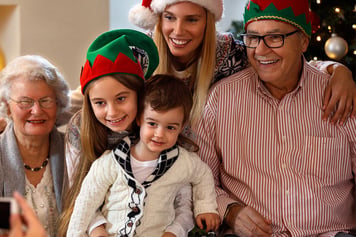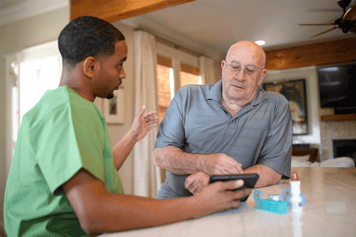Home is where many people want to be for the holidays. It’s also where most people say they want to grow old. But every year as the weather grows colder and the holidays approach, more elderly people end up in the emergency department.
“At any age, people want to be home for the holidays. But for older adults, it can be especially important,” says Erin Siciliano, RN, the director of operations at an Amedisys home health care center in Lexington, SC. “This may be the only time of year they get to be with their families.”
[action 1]
7 Holiday Safety Tips for Older Adults
Loved ones play an important role in keeping older adults safe at home for the holidays. Here are a few ways you can help:
#1 Encourage healthy choices.
Special meals and holiday treats are part of the fun of the season. But too many rich, salty and fatty foods can worsen many health conditions, including heart disease, diabetes, and high blood pressure. Strive for moderation, which allows elderly people to enjoy their favorite foods without overdoing it.
Make sure there are healthy, convenient options available like pre-cut fruits and vegetables. Staying hydrated is often a struggle for older adults so be sure to also have water bottles on hand. If their doctor recommends it, schedule time for regular physical activity like a family walk (at the mall if it’s slippery outside) or chores around the house. Balance busy days with periods of rest to prevent older adults from getting overwhelmed or disoriented.
#2 Spend time together.
“The holidays can be a difficult time for older adults,” says Siciliano. “They may not be able to get out of the house as much in winter. As they look back on past holidays, they may feel depressed if they can’t do the things they used to be able to do or if they’ve lost people they love.” Listening to how they feel can help combat isolation and depression in the elderly. Being there will also help you see if they’re following doctor’s orders such as using an assistive device and taking medications as prescribed.
#3 Understand their day-to-day needs.
Ask questions about how your elderly loved one is managing daily tasks like taking out the trash or picking up the mail. If they need more help, see if a neighbor, friend or another helper can check on basic needs like making sure your loved one is staying warm and has healthy food to eat.
#4 Recognize the signs of declining health.
“At this time of year, older adults tend to ignore worsening symptoms of chronic illness, partly because they want to be home for the holidays,” says Siciliano. But early intervention is more effective at keeping elderly people at home and out of the hospital. Check-in regularly to see if your loved one’s needs have changed and call a healthcare provider if you recognize signs of declining health.
If your loved one is eligible, home health and hospice care can help keep older adults at home for the holidays. “For patients who need it, we can schedule daily touch points for the first 14 days of care. We also have several specialty clinical programs to help older adults stay home and out of the hospital,” says Christine Giordano, RN, the area vice president of clinical for Amedisys in Lexington, SC.
Among other services, home health and hospice provide education for patients and caregivers, such as how to take medications properly, and can help with elderly fall prevention and other safety measures. Social workers can help find community resources like food banks and teach coping skills and stress management.
“The more eyes you can have in the home, the better able you’ll be to keep a loved one safe,” says Breanna Wicker, director of growth solutions for Amedisys. “Whether you need to move furniture or rugs to reduce falls, get a medical alert device or make other adjustments, it’s important to identify the need for extra care before a crisis occurs.”
#5 Ask for help.
It can be hard for elderly caregivers to ask for help but it’s much needed, especially during the hustle and bustle of the holidays. For example, you might ask a friend or family member to host a holiday meal this year or to help with shopping. Check with your local Area Agency on Aging for help finding community resources such as transportation and meal preparation services. If you need more support, home health can provide care wherever it is that the patient calls home.
#6 Take precautions against illness.
Cold and flu season poses special risks for elderly people. They’re more likely to get sick and have serious complications like pneumonia. Simple precautions like staying away from those who are sick, frequent hand-washing, and using antibacterial soaps and hand sanitizers can minimize the spread of illness. “Elderly people need to build strong reserves,” says Siciliano. “The more strength and endurance they have to start with, the better off they’ll be if they’re around someone who is sick.”
#7 Celebrate with care.
Holiday decorations can add to the festivities, but power cords, rugs, and other decorations can also pose fire and fall hazards. Help your elderly loved one decorate with their needs in mind. If the older adult will be traveling, try to make accommodations in advance so they won’t have to worry about stairs, lighting, and other potential fall hazards. “When older adults are outside their normal routine, they get nervous,” says Siciliano. “That’s when they get into trouble.”
By taking steps to ensure your loved one’s safety and getting help when needed, you can help make this holiday season memorable and meaningful for your whole family.
Would you or your loved one benefit from home health care? Take our quiz to see if these services are a good fit.
.png?width=800&height=533&name=iStock-477742824_edited%20(002).png)




